The North Carolina Department of Transportation said that as May 19 its crews, contractors, and volunteers have collected 6.3 million pounds of litter from along the state’s roads – putting them on pace to exceed the record for litter collection set in 2019.
[Above photo by the NCDOT]
That 6.3 million pounds of trash is roughly the same amount collected in 2020 and puts the agency on track to surpass its 2019 record, when NCDOT crews, contractors, and volunteers collected 10.5 million pounds of litter.
“We are on track to pick up more litter in 2021 than in any year previous,” noted Eric Boyette, NCDOT secretary, in a statement. “But to truly solve this problem, North Carolina must begin dealing with litter proactively. Secure your load, don’t throw trash out the window and do your part to make sure others know this too.”
He added that NCDOT’s litter management programs are “multifaceted” as the department makes use of both state-owned resources and contract services. NCDOT’s Sponsor-A-Highway Program allows businesses, organizations and individuals to sponsor litter removal along roadsides. The agency also partners with more than 120,000 participants in the Adopt-A-Highway Program, where volunteers pledge to clean a section of our highways at least four times a year.
State departments of transportation across the country are ramping up similar anti-litter outreach and cleanup efforts.
In April, the Ohio Department of Transportation joined forces with the Ohio Environmental Protection Agency and Ohio Department of Natural Resources to conduct a statewide anti-litter campaign – called “A Little Litter is a Big Problem” – to highlight the negative impact litter has on the state’s transportation system, parks, beachfronts, and waterways.
The Ohio DOT noted in a statement that it alone has spent at least $48.6 million to deal with litter since 2011 and that its staff spent 151,410 hours picking up trash in 2020.
Meanwhile, the Rhode Island Department of Transportation launched a new “Clean Rhodes” anti-litter initiative on April 22.
“Litter is one of the biggest sources of complaints for RIDOT and has us spending hundreds of thousands of dollars a year in a seemingly never-ending battle of picking up trash along our roads,” Peter Alviti, Jr., the agency’s director, in a statement. “We’re upping our game and enlisting the help of the business and volunteer community to help us address this blight on our roads.”
RIDOT, which said it spends $800,000 annually to pick up trash on state roads, noted that the goal of this campaign is to remove 1 million pieces of litter. The agency is also seeking to buy specialized litter removal equipment that attaches to its maintenance vehicles for some $750,000 so it can rake and clean litter from strips of land and other larger green spaces along roads more easily.
Meanwhile, the Delaware Department of Transportation, for example, recently renewed focus on its “Keep DE Litter Free” campaign. To date in 2021, the agency said its crewed collected and cleared nearly 16,000 bags of trash from state roadways – adding to the more than 51,000 bags of trash collected and cleared in 2020.
That includes more than 6,800 tires, 3,500 signs, and 250 appliances removed from Delaware roads, the Delaware DOT pointed out.

